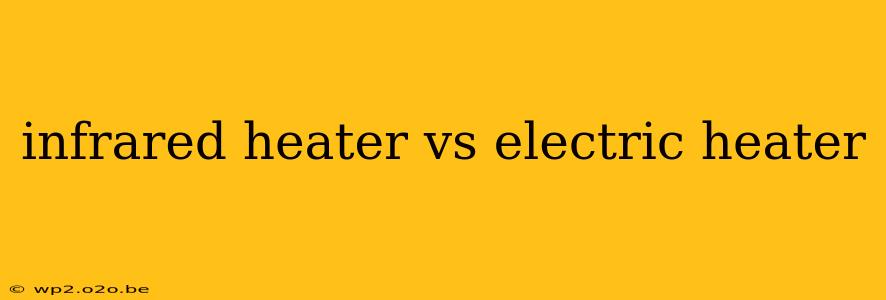Choosing the right heater for your home or workspace can significantly impact your comfort and energy bills. Two popular options are infrared heaters and electric heaters, each with distinct advantages and disadvantages. This comprehensive guide will delve into the key differences between infrared and electric heaters to help you make an informed decision.
Understanding the Fundamentals: How Each Type Works
Before comparing, let's understand the core heating mechanisms:
Electric Heaters: These heaters work by converting electrical energy into heat through resistance heating. An element within the heater gets hot, warming the surrounding air. This warmed air then circulates, heating the entire room. Examples include fan heaters, oil-filled radiators, and convector heaters.
Infrared Heaters: These heaters don't heat the air directly. Instead, they emit infrared radiation, which is a type of electromagnetic radiation. This radiation is absorbed by objects and people in its path, causing them to heat up. The warmed objects then radiate heat into the surrounding air.
Key Differences: A Head-to-Head Comparison
| Feature | Infrared Heater | Electric Heater |
|---|---|---|
| Heating Method | Radiates infrared energy, heating objects directly | Heats air through resistance heating |
| Heating Speed | Generally faster; immediate warmth | Slower; takes time to heat the air |
| Energy Efficiency | Potentially more efficient, as it directly heats occupants and objects | Can be less efficient, as it heats the air, which can escape |
| Air Circulation | Minimal to no air circulation | Significant air circulation; can dry out air |
| Cost | Typically more expensive upfront | Typically less expensive upfront |
| Running Costs | Can be lower, depending on usage and efficiency | Can be higher, especially in larger spaces |
| Portability | Often portable and easy to move | Portability varies greatly depending on type |
| Safety | Generally safer, with lower risk of burns if designed correctly | Can pose a burn risk if touched directly; some models have safety features |
| Best for... | Targeted heating, smaller spaces, outdoor use (certain models) | Larger spaces, whole-room heating |
Infrared Heaters: Pros and Cons
Pros:
- Fast Heating: Infrared heaters provide almost instant warmth.
- Targeted Heating: You can direct the heat where it's needed most, saving energy.
- Energy-Efficient (Potentially): Because they heat objects directly, they can be more energy-efficient than electric heaters that heat the air.
- Quieter Operation: Many infrared heaters operate quietly without fans.
Cons:
- Higher Initial Cost: Infrared heaters often have a higher initial purchase price.
- Uneven Heating: If not positioned correctly, it may cause uneven heating within a room.
- Direct Heat Can Be Uncomfortable: Prolonged exposure to direct infrared radiation can be uncomfortable for some.
Electric Heaters: Pros and Cons
Pros:
- Lower Initial Cost: Electric heaters are generally less expensive to purchase.
- Even Heating (Potentially): Electric heaters can provide more even heating throughout a larger space.
- Wide Variety of Types: Many different types cater to varied needs and budgets.
Cons:
- Slower Heating: It takes time to warm the air effectively.
- Less Energy-Efficient (Potentially): Heating the air can lead to energy loss as warm air escapes.
- Can Dry Out the Air: The air circulation can reduce humidity levels.
Making the Right Choice: Factors to Consider
Several factors should influence your decision:
- Room Size: Electric heaters are better suited for larger spaces; infrared heaters are more effective in smaller areas.
- Budget: Consider both the initial purchase price and the ongoing running costs.
- Heating Needs: Do you need whole-room heating or targeted warmth?
- Energy Efficiency: Consider your energy consumption goals and the potential savings.
- Safety: Check safety features and ensure proper ventilation.
Conclusion: Finding the Perfect Fit
Both infrared and electric heaters offer viable solutions for heating your space. By understanding their respective strengths and weaknesses and considering the factors discussed above, you can choose the heating system that best meets your individual needs and budget, creating a warm and comfortable environment. Remember to always consult professional advice when undertaking home heating installations.

